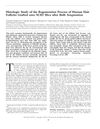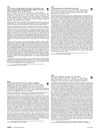 108 citations,
September 2002 in “The Journal of clinical investigation/The journal of clinical investigation”
108 citations,
September 2002 in “The Journal of clinical investigation/The journal of clinical investigation” Lowering testosterone speeds up wound healing in male mice.
 99 citations,
June 2005 in “Journal of Cosmetic Dermatology”
99 citations,
June 2005 in “Journal of Cosmetic Dermatology” Hair ages due to genetics and environmental factors, leading to graying and thinning, with treatments available for some conditions.
 48 citations,
May 2015 in “NPJ microgravity”
48 citations,
May 2015 in “NPJ microgravity” A 3-month stay in space causes skin thinning, disrupts hair growth, and changes muscle-related genes in mice.
 43 citations,
June 2012 in “Lasers in Medical Science”
43 citations,
June 2012 in “Lasers in Medical Science” Low-level laser treatment helped rats regrow hair faster after chemotherapy.
 22 citations,
January 2018 in “Experimental Dermatology”
22 citations,
January 2018 in “Experimental Dermatology” The meeting focused on understanding, diagnosing, and finding treatments for irreversible hair loss diseases.
 19 citations,
November 2001 in “Journal of Investigative Dermatology Symposium Proceedings”
19 citations,
November 2001 in “Journal of Investigative Dermatology Symposium Proceedings” Human hair follicles can regenerate and recover after severe injury by going through a brief abnormal resting phase before growing again.
 12 citations,
December 1987 in “Cancer Chemotherapy and Pharmacology”
12 citations,
December 1987 in “Cancer Chemotherapy and Pharmacology” Vitamin E in the diet might help protect against hair loss caused by the chemotherapy drug doxorubicin in rabbits.
 11 citations,
June 2012 in “Archives of Dermatological Research”
11 citations,
June 2012 in “Archives of Dermatological Research” L-cystine and vitamin B6 at high doses prevented hair loss in mice treated with a chemotherapy drug.
 8 citations,
January 2013 in “The scientific world journal/TheScientificWorldjournal”
8 citations,
January 2013 in “The scientific world journal/TheScientificWorldjournal” Human hair follicles may provide a noninvasive way to diagnose diseases and have potential in regenerative medicine.
 8 citations,
July 2012 in “Cambridge University Press eBooks”
8 citations,
July 2012 in “Cambridge University Press eBooks” Androgens can both increase body hair and cause scalp hair loss.
 5 citations,
September 2018 in “Acta histochemica”
5 citations,
September 2018 in “Acta histochemica” The mTOR pathway proteins are altered in the hair follicles of patients with Lichen Planopilaris and Frontal Fibrosing Alopecia.
 5 citations,
December 2015 in “Dermatologic Therapy”
5 citations,
December 2015 in “Dermatologic Therapy” Using a certain drug on the skin can help prevent hair loss caused by pulling on the hair.
 4 citations,
November 2014
4 citations,
November 2014 The skin protects the body, regulates temperature, senses touch, and makes vitamin D.
2 citations,
November 2022 in “Veterinary sciences” The interdigital gland of Vembur sheep shows sex-based differences in size and chemical makeup, possibly affecting communication and disease protection.
 2 citations,
November 2019 in “Skin appendage disorders”
2 citations,
November 2019 in “Skin appendage disorders” Platelet-rich plasma doesn't prevent hair loss from chemotherapy, and mononuclear cells only help against hair loss from one specific chemotherapy drug.
 2 citations,
December 2017 in “Bangladesh Journal of Pharmacology”
2 citations,
December 2017 in “Bangladesh Journal of Pharmacology” Black seed oil significantly protects against hair loss from chemotherapy.
 1 citations,
June 2022 in “International Journal of Health Sciences (IJHS) (En línea)”
1 citations,
June 2022 in “International Journal of Health Sciences (IJHS) (En línea)” Herbal hair oils help with hair problems and are safer than synthetic products.
 1 citations,
October 2015 in “CRC Press eBooks”
1 citations,
October 2015 in “CRC Press eBooks” Nutricosmetics with active ingredients can help with hair loss and improve hair growth.
 August 2024 in “Research Square (Research Square)”
August 2024 in “Research Square (Research Square)” Using 5-alpha reductase inhibitors may lower the risk of breast cancer in females.
 July 2023 in “Research Square (Research Square)”
July 2023 in “Research Square (Research Square)” Skin's uneven surface and hair follicles affect its stress and strain but don't change its overall strength, and help prevent the skin from peeling apart.
 September 2021 in “International Journal of Biomedicine”
September 2021 in “International Journal of Biomedicine” Certain gene variations are linked to a higher risk of severe acne, suggesting a genetic influence on the condition.
 December 2020 in “Current Sexual Health Reports”
December 2020 in “Current Sexual Health Reports” Finasteride can have lasting negative effects on brain function and behavior by disrupting neurosteroid production.
 October 2018 in “Ayurlog: national journal of research in ayurveda science”
October 2018 in “Ayurlog: national journal of research in ayurveda science” The review suggests that lifestyle, diet, and environment affect hair loss, and Ayurveda offers ways to maintain hair health.
 May 2017 in “Journal of The American Academy of Dermatology”
May 2017 in “Journal of The American Academy of Dermatology” LED light helps human hair root cells grow and move by activating certain cell pathways.
 August 2015 in “Free Radical Biology and Medicine”
August 2015 in “Free Radical Biology and Medicine” Some treatments can improve skin's defense against damage, but overuse may cause other skin problems.
 August 2015 in “Free Radical Biology and Medicine”
August 2015 in “Free Radical Biology and Medicine” The document concludes that the discussed biological mechanisms and potential therapies are not related to hair loss or hair growth.
 December 2014 in “Research and Reviews: Journal of Pharmacology and Toxicological Studies”
December 2014 in “Research and Reviews: Journal of Pharmacology and Toxicological Studies” Cabbage extract in hair gel may promote hair growth and could help treat hair loss.
 March 2010 in “Cosmetic Dermatology”
March 2010 in “Cosmetic Dermatology” Hair straightening methods have advanced to improve effectiveness and reduce damage, but still rely on heat and chemicals.
 211 citations,
February 2009 in “European journal of pharmaceutics and biopharmaceutics”
211 citations,
February 2009 in “European journal of pharmaceutics and biopharmaceutics” Hair follicles help absorb and store topical compounds, aiding targeted drug delivery.
 191 citations,
May 2018 in “British journal of dermatology/British journal of dermatology, Supplement”
191 citations,
May 2018 in “British journal of dermatology/British journal of dermatology, Supplement” Alopecia areata is likely an autoimmune disease with unclear triggers, involving various immune cells and molecules, and currently has no cure.





























